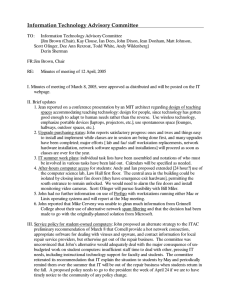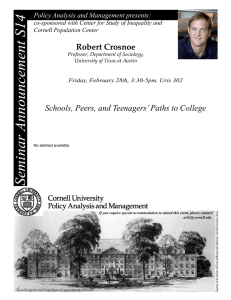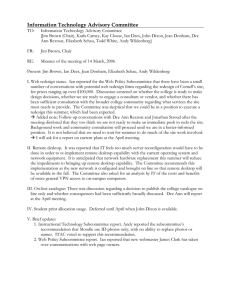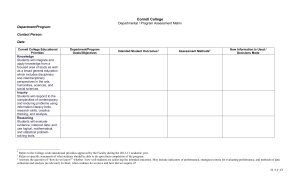Information Technology Advisory Committee
advertisement
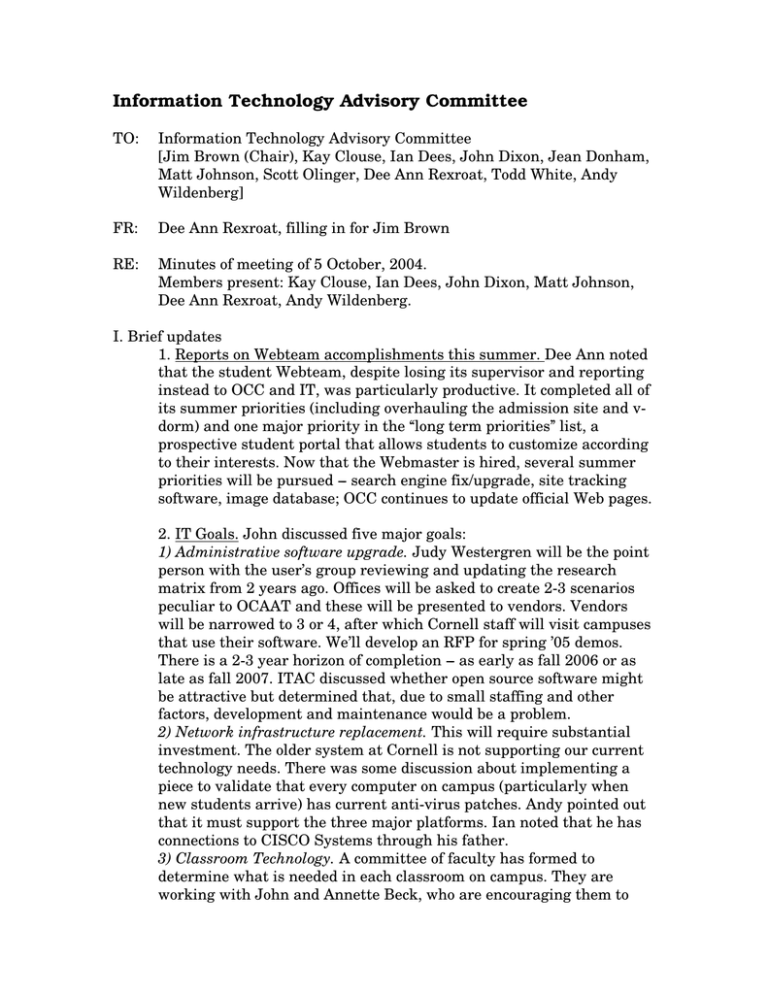
Information Technology Advisory Committee TO: Information Technology Advisory Committee [Jim Brown (Chair), Kay Clouse, Ian Dees, John Dixon, Jean Donham, Matt Johnson, Scott Olinger, Dee Ann Rexroat, Todd White, Andy Wildenberg] FR: Dee Ann Rexroat, filling in for Jim Brown RE: Minutes of meeting of 5 October, 2004. Members present: Kay Clouse, Ian Dees, John Dixon, Matt Johnson, Dee Ann Rexroat, Andy Wildenberg. I. Brief updates 1. Reports on Webteam accomplishments this summer. Dee Ann noted that the student Webteam, despite losing its supervisor and reporting instead to OCC and IT, was particularly productive. It completed all of its summer priorities (including overhauling the admission site and vdorm) and one major priority in the ‘‘long term priorities’’ list, a prospective student portal that allows students to customize according to their interests. Now that the Webmaster is hired, several summer priorities will be pursued --- search engine fix/upgrade, site tracking software, image database; OCC continues to update official Web pages. 2. IT Goals. John discussed five major goals: 1) Administrative software upgrade. Judy Westergren will be the point person with the user’s group reviewing and updating the research matrix from 2 years ago. Offices will be asked to create 2-3 scenarios peculiar to OCAAT and these will be presented to vendors. Vendors will be narrowed to 3 or 4, after which Cornell staff will visit campuses that use their software. We’ll develop an RFP for spring ’05 demos. There is a 2-3 year horizon of completion --- as early as fall 2006 or as late as fall 2007. ITAC discussed whether open source software might be attractive but determined that, due to small staffing and other factors, development and maintenance would be a problem. 2) Network infrastructure replacement. This will require substantial investment. The older system at Cornell is not supporting our current technology needs. There was some discussion about implementing a piece to validate that every computer on campus (particularly when new students arrive) has current anti-virus patches. Andy pointed out that it must support the three major platforms. Ian noted that he has connections to CISCO Systems through his father. 3) Classroom Technology. A committee of faculty has formed to determine what is needed in each classroom on campus. They are working with John and Annette Beck, who are encouraging them to think big. Faculty will tell them what they want to do and IT will determine how to allow them to accomplish that. 4) Create a replacement cycle for our technology. This will cover work stations, network devices, hardware, lab, classroom, administrative, printers, fiber, software, etc. 5) Moodle. Only Andy is currently using this technology, though a handful of other faculty are interested. While he says it is easier than using Dreamweaver, Andy does not have enough expertise with it to lead training. Need to develop training for faculty and create excitement about it. 3. Windows service pack 2. Although it provides more security, some companies, such as IBM, have discovered problems and won’t install it. John’s staff is still testing it on the AS400. Otherwise, everything seems to work fine with Cornell’s system. If the AS400 test is OK, IT will push out the upgrades on the local server. 4. Server storage of announcements [like Today @ Cornell]. Mass emails such as Today @ Cornell are stored as a single message on Windows Exchange with pointers leading to it. Each individual’s quota, however, is debited for that amount of space. Discussion ensued about Today @ Cornell. Dee Ann noted that the policy change to limit number of times each event/announcement runs was based on readability and the increasingly lengthy and repetitive daily emails. She said they heard one complaint about the policy (Andy said he heard several) and worked with that student to accommodate his needs, which involved giving students access to the master calendar. It was agreed that a bare list of events, each of which links to more information, would kill readership. We discussed a Webpage for each day and a readership survey, which was last done 2.5 years ago. Dee Ann Will reassess. Also, it was suggested that the weekly e-Newsletter include hotlinks from the headlines. 5. After hours IT emergency response services. Postponed discussion. II. Review policy on maintaining email accounts for faculty who separate from the college. 1. Use of automatic forwarding. We agreed that 90 days is sufficient for maintaining an email account. Additional time may be granted by written request not to exceed 12 months from official termination date, but at that point the email will be forwarded and is no longer stored on the Cornell server. 2. Storage space reduction. Reduce to 10-25 megs III. Graham Leach Bliley Act. John passed out a sheet describing this privacy act directed at financial institutions to establish safeguards for customers. IT will have to create a security plan to ensure the privacy of the financial records of students, faculty, and staff. This will effectively become Goal #6 for IT, and will happen over the next year. More firewalls, more secure password requirements, and training will be involved. IV. Review of printer/copier chargebacks. Postponed discussion. V. Policy on virus protection software for non-institutional computers on our network. What do we do about student computers? Over the summer students received correspondence asking them to bring, ‘‘as a courtesy,’’ workstations with current virus protections and patches. Most students did not do this and IT staff touched about 200 computers. In the future the college may require this and will be explicit about how to protect computers against viruses. Although IT wants to serve students, it cannot be expected to function as a computer store so there may be a charge for protecting computers. Ian noted that Best Buy charges $50 to $75/hour. IT would like to have an infrastructure in place by fall 2005 that allows all students to access windows updates on our network. VI. Servicing student-owned computers: more and more students show up with computers which do not function properly. How can we best serve them? See V. above.
